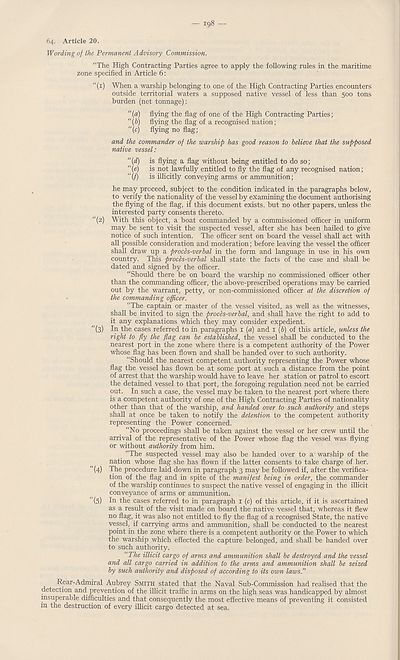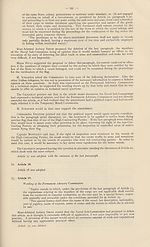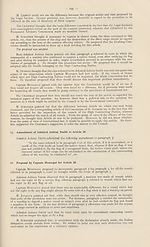Armament > Conference for the control of the international trade in arms, munitions and implements of war
(200)
Download files
Complete book:
Individual page:
Thumbnail gallery: Grid view | List view

— 198
64. Article 20.
Wording of the Permanent Advisory Commission.
“The High Contracting Parties agree to apply the following rules in the maritime
zone specified in Article 6:
“(1) When a warship belonging to one of the High Contracting Parties encounters
outside territorial waters a supposed native vessel of less than 500 tons
burden (net tonnage):
“{a) flying the flag of one of the High Contracting Parties;
“(b) flying the flag of a recognised nation;
“(c) flying no flag;
and the commander of the warship has good reason to believe that the supposed
native vessel:
“(d) is flying a flag without being entitled to do so;
“(e) is not lawfully entitled to fly the flag of any recognised nation;
“(f) is illicitly conveying arms or ammunition;
he may proceed, subject to the condition indicated in the paragraphs below,
to verify the nationality of the vessel by examining the document authorising
the flying of the flag, if this document exists, but no other papers, unless the
interested party consents thereto.
“(2) With this object, a boat commanded by a commissioned officer in uniform
may be sent to visit the suspected vessel, after she has been hailed to give
notice of such intention. The officer sent on board the vessel shall act with
all possible consideration and moderation; before leaving the vessel the officer
shall draw up a proces-verbal in the form and language in use in his own
country. This proces-verbal shall state the facts of the case and shall be
dated and signed by the officer.
“Should there be on board the warship no commissioned officer other
than the commanding officer, the above-prescribed operations may be carried
out by the warrant, petty, or non-commissioned officer at the discretion of
• the commanding officer.
“The captain or master of the vessel visited, as well as the witnesses,
shall be invited to sign the proces-verbal, and shall have the right to add to
it any explanations which they may consider expedient.
“(3) In the cases referred to in paragraphs 1 (a) and 1 (b) of this article, unless the
right to fly the flag can be established, the vessel shall be conducted to the
nearest port in the zone where there is a competent authority of the Power
whose flag has been flown and shall be handed over to such authority.
“Should the nearest competent authority representing the Power whose
flag the vessel has flown be at some port at such a distance from the point
of arrest that the warship would have to leave her station or patrol to escort
the detained vessel to that port, the foregoing regulation need not be carried
out. In such a case, the vessel may be taken to the nearest port where there
is a competent authority of one of the High Contracting Parties of nationality
other than that of the warship, and handed over to such authority and steps
shall at once be taken to notify the detention to the competent authority
representing the Power concerned.
“No proceedings shall be taken against the vessel or her crew until the
arrival of the representative of the Power whose flag the vessel was flying
or without authority from him.
“The suspected vessel may also be handed over to a warship of the
nation whose flag she has flown if the lattei consents to take charge of her.
“(4) The procedure laid down in paragraph 3 may be followed if, after the verifica¬
tion of the flag and in spite of the manifest being in order, the commander
of the warship continues to suspect the native vessel of engaging in the illicit
conveyance of arms or ammunition.
“(5) In the cases referred to in paragraph 1 (c) of this article, if it is ascertained
as a result of the visit made on board the native vessel that, whereas it flew
no flag, it was also not entitled to fly the flag of a recognised State, the native
vessel, if carrying arms and ammunition, shall be conducted to the nearest
point in the zone where there is a competent authority or the Power to which
the warship which effected the capture belonged, and shall be handed over
to such authority.
“The illicit cargo of arms and ammunition shall be destroyed and the vessel
and all cargo carried in addition to the arms and ammunition shall be seized
by such authority and disposed of according to its own laws.”
Rear-Admiral Aubrey Smith stated that the Naval Sub-Commission had realised that the
detection and prevention of the illicit traffic in arms on the high seas was handicapped by almost
insuperable difficulties and that consequently the most effective means of preventing it consisted
m the destruction of every illicit cargo detected at sea.
64. Article 20.
Wording of the Permanent Advisory Commission.
“The High Contracting Parties agree to apply the following rules in the maritime
zone specified in Article 6:
“(1) When a warship belonging to one of the High Contracting Parties encounters
outside territorial waters a supposed native vessel of less than 500 tons
burden (net tonnage):
“{a) flying the flag of one of the High Contracting Parties;
“(b) flying the flag of a recognised nation;
“(c) flying no flag;
and the commander of the warship has good reason to believe that the supposed
native vessel:
“(d) is flying a flag without being entitled to do so;
“(e) is not lawfully entitled to fly the flag of any recognised nation;
“(f) is illicitly conveying arms or ammunition;
he may proceed, subject to the condition indicated in the paragraphs below,
to verify the nationality of the vessel by examining the document authorising
the flying of the flag, if this document exists, but no other papers, unless the
interested party consents thereto.
“(2) With this object, a boat commanded by a commissioned officer in uniform
may be sent to visit the suspected vessel, after she has been hailed to give
notice of such intention. The officer sent on board the vessel shall act with
all possible consideration and moderation; before leaving the vessel the officer
shall draw up a proces-verbal in the form and language in use in his own
country. This proces-verbal shall state the facts of the case and shall be
dated and signed by the officer.
“Should there be on board the warship no commissioned officer other
than the commanding officer, the above-prescribed operations may be carried
out by the warrant, petty, or non-commissioned officer at the discretion of
• the commanding officer.
“The captain or master of the vessel visited, as well as the witnesses,
shall be invited to sign the proces-verbal, and shall have the right to add to
it any explanations which they may consider expedient.
“(3) In the cases referred to in paragraphs 1 (a) and 1 (b) of this article, unless the
right to fly the flag can be established, the vessel shall be conducted to the
nearest port in the zone where there is a competent authority of the Power
whose flag has been flown and shall be handed over to such authority.
“Should the nearest competent authority representing the Power whose
flag the vessel has flown be at some port at such a distance from the point
of arrest that the warship would have to leave her station or patrol to escort
the detained vessel to that port, the foregoing regulation need not be carried
out. In such a case, the vessel may be taken to the nearest port where there
is a competent authority of one of the High Contracting Parties of nationality
other than that of the warship, and handed over to such authority and steps
shall at once be taken to notify the detention to the competent authority
representing the Power concerned.
“No proceedings shall be taken against the vessel or her crew until the
arrival of the representative of the Power whose flag the vessel was flying
or without authority from him.
“The suspected vessel may also be handed over to a warship of the
nation whose flag she has flown if the lattei consents to take charge of her.
“(4) The procedure laid down in paragraph 3 may be followed if, after the verifica¬
tion of the flag and in spite of the manifest being in order, the commander
of the warship continues to suspect the native vessel of engaging in the illicit
conveyance of arms or ammunition.
“(5) In the cases referred to in paragraph 1 (c) of this article, if it is ascertained
as a result of the visit made on board the native vessel that, whereas it flew
no flag, it was also not entitled to fly the flag of a recognised State, the native
vessel, if carrying arms and ammunition, shall be conducted to the nearest
point in the zone where there is a competent authority or the Power to which
the warship which effected the capture belonged, and shall be handed over
to such authority.
“The illicit cargo of arms and ammunition shall be destroyed and the vessel
and all cargo carried in addition to the arms and ammunition shall be seized
by such authority and disposed of according to its own laws.”
Rear-Admiral Aubrey Smith stated that the Naval Sub-Commission had realised that the
detection and prevention of the illicit traffic in arms on the high seas was handicapped by almost
insuperable difficulties and that consequently the most effective means of preventing it consisted
m the destruction of every illicit cargo detected at sea.
Set display mode to:
![]() Universal Viewer |
Universal Viewer | ![]() Mirador |
Large image | Transcription
Mirador |
Large image | Transcription
Images and transcriptions on this page, including medium image downloads, may be used under the Creative Commons Attribution 4.0 International Licence unless otherwise stated. ![]()
| League of Nations > Armament > Conference for the control of the international trade in arms, munitions and implements of war > (200) |
|---|
| Permanent URL | https://digital.nls.uk/195384363 |
|---|
| Shelfmark | LN.IX |
|---|
| Description | Over 1,200 documents from the non-political organs of the League of Nations that dealt with health, disarmament, economic and financial matters for the duration of the League (1919-1945). Also online are statistical bulletins, essential facts, and an overview of the League by the first Secretary General, Sir Eric Drummond. These items are part of the Official Publications collection at the National Library of Scotland. |
|---|---|
| Additional NLS resources: |
|

